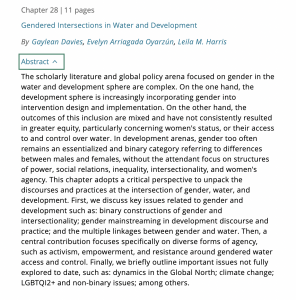
Abstract: The scholarly literature and global policy arena focused on gender in the water and development sphere are complex. On the one hand, the development sphere is increasingly incorporating gender into intervention design and implementation. On the other hand, the outcomes of this inclusion are mixed and have not consistently resulted in greater equity, particularly concerning women’s status, or their access to and control over water. In development arenas, gender too often remains an essentialized and binary category referring to differences between males and females, without the attendant focus on structures of power, social relations, inequality, intersectionality, and women’s agency. This chapter adopts a critical perspective to unpack the discourses and practices at the intersection of gender, water, and development. First, we discuss key issues related to gender and development such as: binary constructions of gender and intersectionality; gender mainstreaming in development discourse and practice; and the multiple linkages between gender and water. Then, a central contribution focuses specifically on diverse forms of agency, such as activism, empowerment, and resistance around gendered water access and control. Finally, we briefly outline important issues not fully explored to date, such as: dynamics in the Global North; climate change; LGBTQI2+ and non-binary issues; among others.
Davies, G., Arriagada Oyarzún, E., Harris, L.M. (2023). Gendered intersections in water and development. In S. Hellberg, F. Söderbaum, A. Swain & J. Öjendal (Eds.), Routledge Handbook of Water and Development. (pp. 292-302). Routledge. DOI: 10.4324/9781003095545
The full book chapter is available for download via this link.